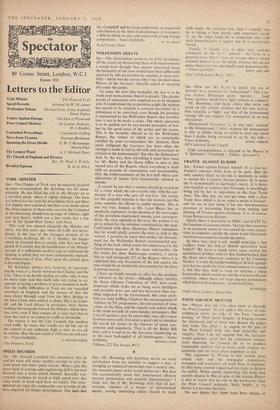WOLFENDEN DEBATE SIR,—The Government proposes to drive prostitutes off the
streets by threatening them with imprisonment.
would have thought that anyone concerned about the humanity of our laws would have been sufficiently alarmed by this proposition to consider it most care- fully—which was the reason why I was shocked when Pharos, in the Spectator, cheerily talked of sweeping dirt under the carpet.
To make the new idea workable, the law is to be made even more asinine than it is already. The slender proofs of annoyance now required are to be dropped and, if I understand the proposition aright, the woman has merely to be labelled 'a common prostitute' by a policeman to be convicted, even though the pretence is maintained by the Wolfenden Report that prostitu- tion is not to be made a crime. The whole operation is to be guided, not by any known principles of law. but by the good sense of the police and the courts. This is the bromide offered us by the Wolfenden Report, the virtues of which are so ecstatically extolled by your correspondent Mr. Dumont. How justly indignant the Spectator has been when the attempt is made to fob us off with such protections in relation to the homosexuals! But why the distinction? And, by the way, how refreshing it must have been for Mr. Butler and the Home Office to turn to this second part of the Report, where everything is dealt with on grounds of convenience and practicability. after the embarrassments of the first half where con- siderations of justice were occasionally allowed to intrude.
It cannot be just that a woman should go to prison for a crime which she can commit only with the con- nivance of a man who gets off scot-free. The excuse for this palpable injustice is that the woman, not the man, commits the affront to public decency. This is just not true. Indeed, as Mr. Lyon Blease has so succinctly explained, on the showing of the most eager of the prostitute-imprisoners among your correspon- dents, the very opposite is the case; the woman is to go to prison for the nuisance committed by the man. Confronted with these dilemmas, Pharos announces that he would gladly convict the man as well as the woman. I presume he knew that neither the Govern- ment nor the Wolfenden Report recommended any- thing of the kind, which makes his enthusiasm for the Government measure all the more indefensible. On this point, for sheer Butleresque casuistry, I advise him to read paragraph 257 of the Report, where it is explained that any invocation of the law against the man would be an intolerable intervention by the State in private morals.
I have no simple remedy to offer for the problem of nuisance on the streets—although others, notably the Street Offences Committee of 1928, have made proposals which strike me as being more intelligent and certainly more just and less hysterical than any- thing suggested by the Government. But some prob- lems are truly baffling. I deplore the encouragement of violence on TV programmes, the purveyance of false values on the films, and the salacity and sadism which is the stock-in-trade of some Sunday newspapers. But I am all against a cure by censorship, since this course involves worse evils. It is never a good rule to abandon the search for justice in the interests of quick con- venience and popularity. That is all the Butler Bill does, and it is sad to see the Spectator clambering on to this most bedraggled of all bandwagons.—Yours faithfully, MICHAEL FOOT Tribune, 222 The Strand, WC2










































 Previous page
Previous page